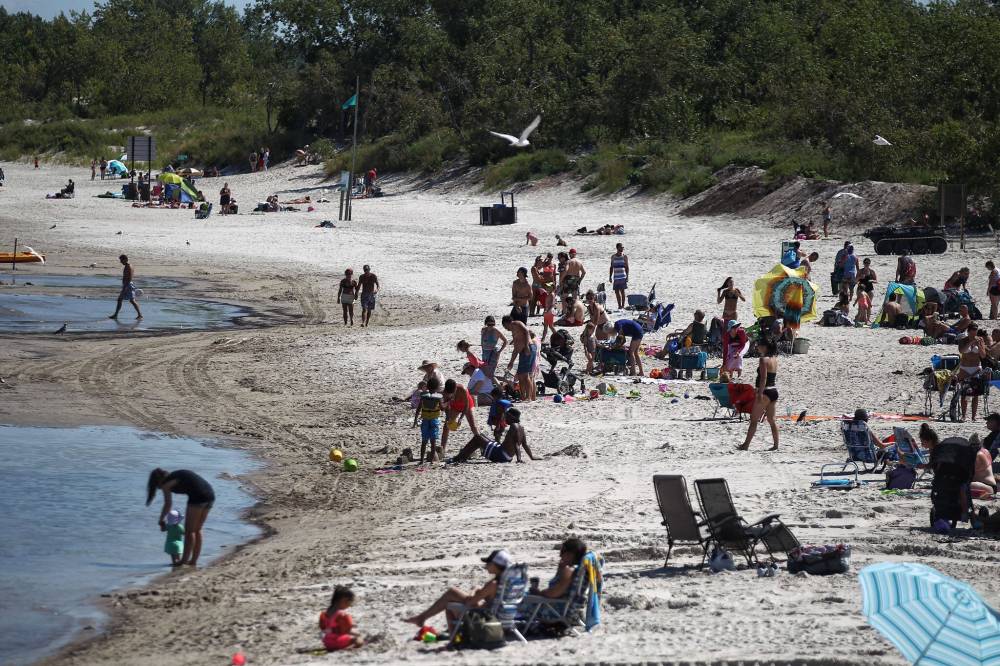Sunseekers headed to Grand Beach this summer may find themselves part of a research project studying water safety and illness caused by recreational water use at beaches across the country.
Manitoba is the latest province to join a nationwide study headed by a Toronto Metropolitan University research team that is hoping to better understand how beach water contaminated with E.coli and blue-green algae impacts public health.
“The whole point of this study is to basically figure out to what extent are people actually getting sick from swimming in beach water that might be contaminated by fecal pollution,” said public health researcher Ian Young, who is heading the project.

MIKE DEAL / FREE PRESS FILES
Manitoba is the latest province to join a nationwide study that aims to understand how beach water contaminated with E.coli and blue-green algae impacts public health.
Researchers manned with iPads are conducting surveys with beachgoers several days a week through the summer on how they spend their time in the water, and collecting water samples.
Those samples will be subject to advanced testing that can detect where E. coli in the water has come from — if it’s human waste, wildlife or another source.
E. coli in water can cause fever, vomiting and diarrhea if it’s ingested. Blue-green algal blooms, which grow from naturally occurring bacteria but are becoming more common because of warming temperatures caused by climate change, can produce toxins that are harmful to people and animals.
The study, funded by the Canadian Institutes of Health Research, began as a pilot in 2022 in Toronto, before expanding across Ontario and into British Columbia, Nova Scotia and, now, Manitoba.
Grand Beach, a popular choice for those seeking summer fun, was an obvious choice to get a handle on how Manitobans are impacted by both bacteria.
“It’s really popular beach, it does have occasional spikes in E.coli, that’s why we picked it,” Young said.
While Manitoba keeps data through the Manitoba Clean Beaches program, Health Canada water-quality guidelines are based on U.S. data that’s more than 15 years old.
Manitoba’s most recent beach condition update, posted July 18, found that E. coli counts were “above the recreational water quality objective” at Victoria, Albert, Hillside and West Grand beaches.
“Re-sampling at these beaches will occur early next week,” the report said. “Beach advisory signs remain posted.”
The report also found E. coli counts briefly spiked at Gimli, Sandy Hook and Winnipeg beaches July 15, but were back to acceptable levels by July 17.
MIKAELA MACKENZIE / FREE PRESS FILES
Blue-green algal blooms can produce toxins that are harmful to people and animals.
Algae advisory signs are up at Silver Lake Beach, after blooms were tested and found to have high counts of blue-green algae cells.
“Algal blooms are difficult to predict and may form and then disperse quickly or last for several days or weeks. Warm and calm weather coupled with relatively high nutrient loads provide ideal conditions for blue-green algae to develop,” the report said.
“People are reminded to avoid swimming in water where severe algal blooms are visible and to prevent pets from drinking water along the shoreline where algal blooms are present.”
Young said despite the advisories, getting sick is still relatively rare and there’s no need to worry as long as people follow basic beach-safety guidance — try not to swallow beach water, follow provincial direction and wash your hands or shower after swimming.
“The majority of the time, beach water is clean, safe to swim in,” he said. “But in this study, we’re trying to capture the background or lower levels of illness than would be detected normally.”
malak.abas@freepress.mb.ca

Malak Abas
Reporter
Malak Abas is a city reporter at the Free Press. Born and raised in Winnipeg’s North End, she led the campus paper at the University of Manitoba before joining the Free Press in 2020. Read more about Malak.
Every piece of reporting Malak produces is reviewed by an editing team before it is posted online or published in print — part of the Free Press‘s tradition, since 1872, of producing reliable independent journalism. Read more about Free Press’s history and mandate, and learn how our newsroom operates.
Our newsroom depends on a growing audience of readers to power our journalism. If you are not a paid reader, please consider becoming a subscriber.
Our newsroom depends on its audience of readers to power our journalism. Thank you for your support.